
The Prisoner of Zenda is an 1894 adventure novel by Anthony Hope, in which the King of Ruritania is drugged on the eve of his coronation and thus is unable to attend the ceremony. Political forces within the realm are such that, in order for the king to retain the crown, his coronation must proceed. Fortuitously, an English gentleman on holiday in Ruritania who resembles the monarch is persuaded to act as his political decoy in an effort to save the unstable political situation of the interregnum.
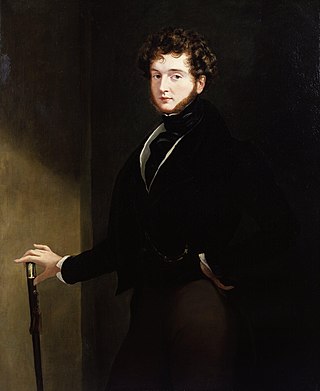
Alfred Guillaume Gabriel Grimod d'Orsay, comte d'Orsay was a French amateur artist, dandy, and man of fashion in the early- to mid-19th century.

Elissa Landi was an Austrian-American actress born in Venice, who was popular as a performer in Hollywood films of the 1920s and 1930s. She "claims descent from Empress Elizabeth of Austria-Hungary", and was noted for her alleged aristocratic bearing.

Midnight is a 1939 American screwball comedy film directed by Mitchell Leisen and starring Claudette Colbert, Don Ameche, John Barrymore, Francis Lederer, Mary Astor, and Elaine Barrie.
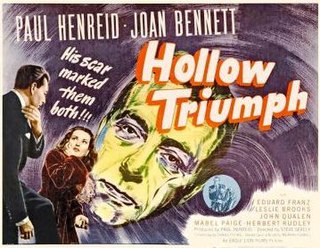
Hollow Triumph is a 1948 American film noir crime film directed by Steve Sekely starring Paul Henreid, Joan Bennett and Leslie Brooks. It was released by Eagle-Lion Films, based on the 1946 novel of the same title written by Murray Forbes. The film's sets were designed by the art director Edward L. Ilou.

Katherine Cecil Thurston, born Kathleen Annie Josephine Madden, was an Irish novelist, best known for two political thrillers.

Beau Geste is a 1926 American silent drama film directed by Herbert Brenon and based on the 1924 novel Beau Geste by P. C. Wren. Ronald Colman stars as the title character.
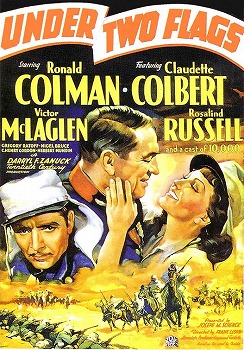
Under Two Flags is a 1936 American adventure romance film directed by Frank Lloyd and starring Ronald Colman, Claudette Colbert, Victor McLaglen, and Rosalind Russell. The picture was based on the 1867 novel of the same name by the writer Ouida. The film was widely popular with audiences of its time. The supporting cast features Nigel Bruce, John Carradine, and Fritz Leiber.

The Prisoner of Zenda is a 1937 American black-and-white adventure film based on Anthony Hope's 1894 novel and the 1896 play. A lookalike has to step in when his royal distant relative is kidnapped to prevent his coronation. This version is widely considered the best of the many film adaptations of the novel and play.

Grand Canary is a 1934 American drama film directed by Irving Cummings and starring Warner Baxter, Madge Evans and Marjorie Rambeau. It is an adaptation of A. J. Cronin's 1933 novel of the same title.

Raffles is a 1930 American pre-Code comedy-mystery film produced by Samuel Goldwyn. It stars Ronald Colman as the title character, a proper English gentleman who moonlights as a notorious jewel thief, and Kay Francis as his love interest. It is based on the play Raffles, the Amateur Cracksman (1906) by E. W. Hornung and Eugene Wiley Presbrey, which was in turn adapted from the 1899 short story collection of the same name by Hornung.
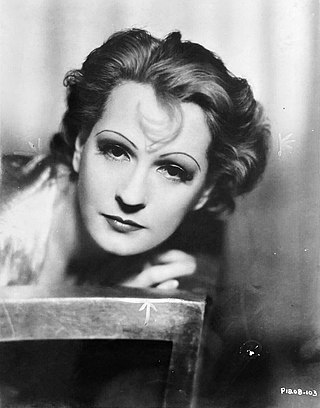
Juliette Compton was an American actress whose career began in the silent film era and concluded with That Hamilton Woman in 1941.

London is a 1926 British silent romantic drama film, directed by Herbert Wilcox and starring Dorothy Gish. The film was adapted by Wilcox from a short story by popular author Thomas Burke. The British Film Institute considers this to be a lost film.

The Amateur Gentleman is a 1936 British drama film directed by Thornton Freeland and starring Douglas Fairbanks Jr., Elissa Landi, Gordon Harker and Margaret Lockwood, with music by Richard Addinsell. It is based on the 1913 novel The Amateur Gentleman by Jeffery Farnol. In an effort to prove his father's innocence of a charge of stealing, a young man disguises himself as a gentleman and travels to Regency London.

Masquerade is a verse play written in 1835 by the Russian Romantic writer Mikhail Lermontov. The four-act play, set in 1830s St. Petersburg aristocratic society, highlights the rebellious spirit and noble mind of the protagonist, Yevgeny Arbenin. It is often compared with Shakespeare's Othello in its essential story line.The play was banned for generations due to its perceived moral offense.
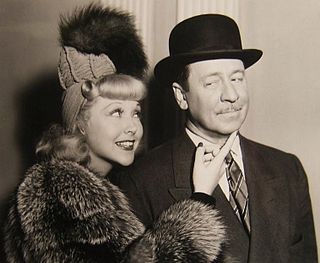
Bedtime Story is a 1941 American comedy film directed by Alexander Hall and starring Fredric March, Loretta Young, and Robert Benchley. The supporting cast includes Eve Arden and Joyce Compton.

The Thirteenth Chair is a 1937 American mystery film directed by George B. Seitz and starring Dame May Whitty, Lewis Stone, Madge Evans, and Elissa Landi. It is based on the 1916 stage play of the same title by Bayard Veiller. This was the third film adaptation of the play. There was an earlier version by director Tod Browning in 1929, with Bela Lugosi in a supporting role, and an even earlier 1919 silent film adaptation that starred Creighton Hale.

Unfaithful is a 1931 American Pre-Code drama film directed by John Cromwell, written by Eve Unsell and John Van Druten, and starring Ruth Chatterton, Paul Lukas, Paul Cavanagh, Juliette Compton, Donald Cook and Emily Fitzroy. It was released on March 14, 1931, by Paramount Pictures.
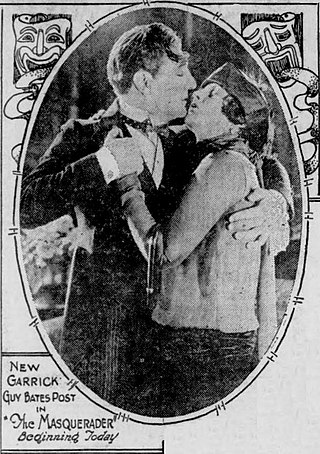
The Masquerader is a 1922 American silent drama film directed by James Young and starring Guy Bates Post, Ruth Cummings, and Edward Kimball. A jaded British politician arranges for his place to be taken by his doppelganger cousin. The film was based on the 1904 novel The Masquerader by Katherine Cecil Thurston. It was remade in 1933 with Ronald Colman in the lead roles.
Leave it to Psmith, subtitled "A comedy of youth, love and misadventure", is a 1930 comedy play by Ian Hay and P. G. Wodehouse, based on the latter's 1923 novel of the same title. It premiered in London's West End at the Shaftesbury Theatre on 29 September 1930.



















